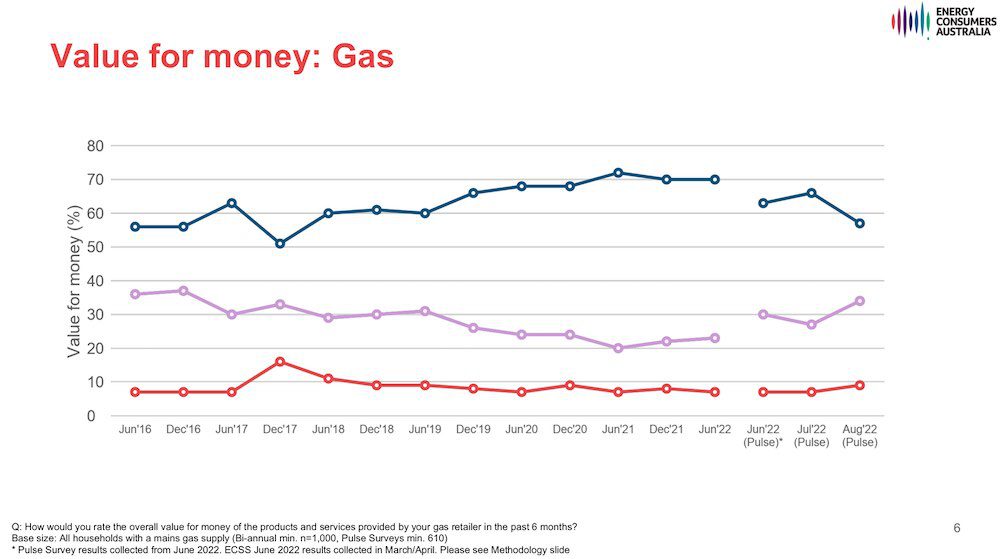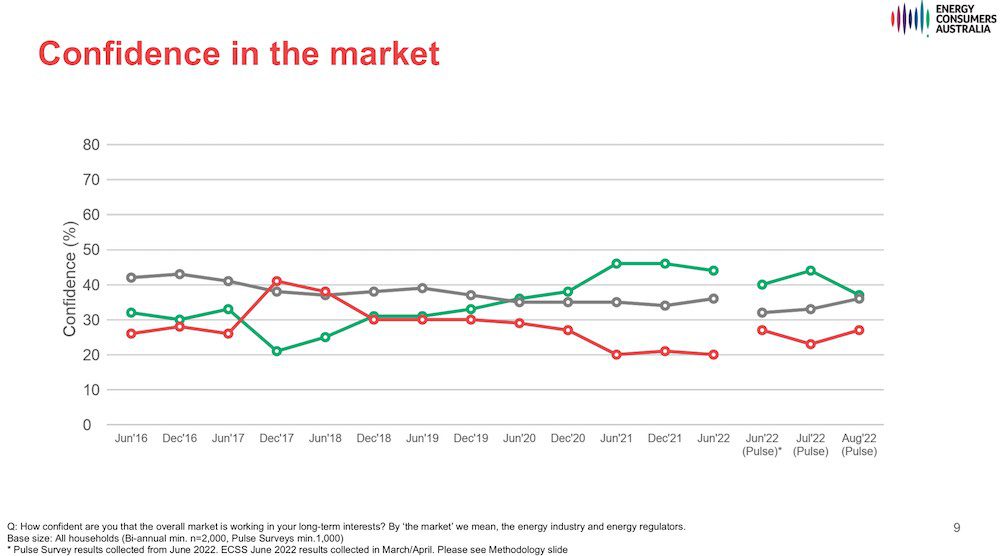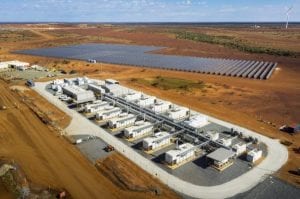Consumer confidence in the energy market has taken another dive as the impacts of the fossil-fuelled energy crisis begin to hit home budgets, leading calls from consumer groups for governments to do more to help electrify homes and make them more energy efficient.
The results of the latest survey from Energy Consumers Australia, published on Tuesday, show consumer confidence in Australia’s energy market and perceptions around the value of electricity and gas have plummeted over the past month.
The result comes at a crucial time, and as utilities – both big and small – wake up to the reality that their future depends on their ability to engage with customers on the continuing roll out of distributed solar and battery storage and electric vehicles.
ECA boss Lynn Gallagher says that while the energy market operator, AEMO, and state energy ministers have taken some strong actions to try to rein in soaring fossil fuel costs and to fast-track the transition to cheap renewables, consumers are struggling to see past their current high bills.
“The factors driving high prices are going to be in play for the foreseeable future but just because prices stay high doesn’t mean bills have to,” she said.
“The best way to deliver lower bills is to provide practical assistance so that Australians can use energy smarter and more efficiently without impacting their quality of life.”
The survey results show that between July and August there has been a significant decrease in the perceived value for money for both electricity (62% to 53%) and gas (66% to 57%), as soaring wholesale energy prices move from the headlines to hip pockets.


At the same time, confidence that the market is working in the long-term interests of consumers has also taken a hit, falling from 44% to 37%, the survey says.

The ECA says it has also found that households are less confident that they have all of the information they need to make the right decisions about their energy services (57% to 51%).
The number of respondents concerned that electricity and gas will become unaffordable for some remained unchanged at 69%, while the percentage of people concerned energy would become unaffordable for them rose slightly to 55%.
The ECA says it added three monthly ‘Pulse’ surveys – June, July and August – to its twice-yearly Energy Consumer Sentiment Survey to gauge how consumers are tracking through the energy crisis, which has seen prices skyrocket and a number of smaller retailers collapse.
The surveys showed consumer sentiment fall sharply in June, as the turmoil in the wholesale energy markets regularly made front page news.
And while this stablisiled slightly in July, Gallagher says the latest survey results show “confidence start to freefall again,” as consumers either receive a higher bill from their electricity or gas retailer, or a letter advising their bill is likely to rise.
“These results show the collapse in consumer confidence we saw in June was not a blip but a serious and ongoing concern,” Gallagher said.
“Consumer concern has moved from something that is abstract to something that is extremely real and is based on actual increases to actual bills.”
Gallagher says assistance should include financial incentives to help make households more energy efficient as well to support the switch from gas powered appliances to electrical ones.
Also found lacking was easy access to credible information from trusted sources to assist in making energy-saving changes to homes and businesses that can help reduce bills without forgoing comfort.
“These are urgent needs, and they aren’t being met with the same focus on targets and measures at the moment that we see in the National Energy Transformation Partnership,” Gallagher said.
“We don’t see consumer confidence in the system rebounding until consumers can see practical action in these areas and that should be a concern for all decision makers across the energy system and in government.”
State and territory energy ministers last week agreed to a long-awaited boost to minimum energy efficiency standards for new-build homes, but this will do little to improve the energy standards of existing housing stock.
Likewise, recent state government policy announcements to phase out the use of gas appliances in new homes will take years to have an effect, and – again – will largely benefit new-build homes.
See: 7-star housing is a step towards zero carbon – but there’s much more to do









